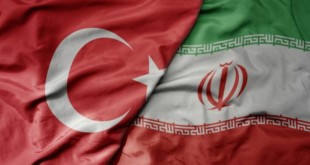A recent public opinion poll shows that 43% of Turkish citizens surveyed view the United States as the biggest threat the country. Israel was viewed by 23.7% as the biggest threat, while traditional ‘enemy’ Greece was viewed as the biggest threat by only 2.3% (Iran 3%, Iraq 2.1%, Russia 1.7%).
This reflects a number of issues, not the least of which is perhaps the fact that the public does not understand the foreign policy of its own government, which has in recent years sought to change its foreign policy to represent more of an East-West balance and less dependence on its relations with NATO. This has come about with the rise of the Justice and Development Party (AKP) and the decline in the power of the traditionally highly influential military, which sought close almost singular ties with NATO.
Turkish Prime Minister Recep Tayyip Erdogan recently sought to explain the country’s new foreign policy track in an opinion piece in New Europe magazine, saying: ‘It is no longer possible to sustain the current world order, which, based as it is on a skewed notion of centre-periphery relations, merely produces injustice and inequality.’
Indeed, having been snubbed by the European Union numerous times, Turkey is now developing a two-pronged strategy that has it focusing attention on its eastern neighbors (notably Syria, Iran and Russia), while at the same time seeking to enhance its prospects for EU membership by intensifying its influence in the Balkan countries, which are growing closer to Europe.
It may also be the case that Turkey is no longer as enamored with EU membership as it once was: Certainly, it has closely watched on the financial crisis and unrest in Greece and the EU’s response, carefully weighing the perceived benefits of joining the bloc.
In November 2010, Turkey received another blow from the EU. In its enlargement progress report, Turkey was described as having failed key EU tests and conditions.
Turkey, the Balkans and the EU
Turkey has revived its activities in the Balkans, focusing primarily, but not only, on Bosnia-Herzegovina, its traditional ally. Perhaps this fact will force the EU to pay more attention to the region’s political processes, as a number of forces vie for influence, most notably the EU, Turkey, the US and Russia.
Thanks in large part to its historical role in the region, Turkey has succeeded in building up its diplomatic and economic influence in those Balkan countries still in the EU membership waiting room ‘ places where the EU has failed to extend its authority, or has simply lost interest.
Primarily in Bosnia and Albania, cultural and religious traces of the Ottoman Empire still exist, and Turkey is keen to take advantage of them. For Turkey, recreating itself as the benefactor of the Balkans, on the periphery of the EU, is a useful way to secure closer cooperation with Europe and cement Ankara’s image as an indispensable geopolitical partner in the region. It is a strategy that essentially means that the EU must either embrace Turkey as a member, or face off against Turkey in the Balkans, and perhaps beyond.
Since the middle of last year, Turkish companies have built the largest university campus in the Balkans in the Sarajevo suburb of Ilidza. In addition, dozens of private and state-owned Turkish companies have flocked to Bosnia, where Turkey is the fourth-largest investor behind Austria, Slovenia, and Germany. Turkey and Bosnia have also signed several bilateral agreements, including an arms-production deal.
Turkish officials repeatedly stress the importance of ties with Bosnia, affirming Ankara’s commitment to protecting Bosnia’s sovereignty, political unity, and territorial integrity. Over the past six months, Turkey has successfully organized several meetings between the foreign ministers of Serbia, Croatia, and Bosnia, culminating in the Istanbul Declaration in late April. The Istanbul Declaration aims to improve regional relations, boost stability, and attract foreign investment, as well as to work toward EU membership.
Turkey has also proven an adept mediator in the region. Since October 2009, Turkey has successfully mediated five rounds of talks aimed at restoring diplomatic ties between Serbia and Bosnia. Following intensive meetings between Serbian and Turkish diplomats in late 2009 and early 2010, the Serbian parliament passed a resolution in late March apologizing for failing to prevent the Srebrenica massacre and expressing sympathy for the victims.
Money talks, and it is generally listened to. Each of these political breakthroughs followed Turkish pledges of increased investment. In early May, Turkey expressed readiness to privatize the financially fragile Serbian state airline, JAT. In late 2008, it bought 49 percent of Bosnia’s national carrier, B&H Airlines. And since January 2010, Serbian exporters have been selling their products in Turkey free of customs duties. (From an earlier article by Anes Alic for RFE/RL). In January 2011, Turkish Airlines agreed to buy the remaining 51% stake in B&H Airlines. The deal is expected to take place once Bosnia’s new government is formed.
Turkey’s desire to position itself as the regional leader and a conciliatory force is not likely to prove popular with EU member states. The European Union has regarded the Balkans as its territory for the past 15 years, even though its engagement was pursued without either great enthusiasm or a clear strategy.
Turkey’s diplomatic and financial deployment in the Balkans has provoked a prompt response from the EU, which hopes to remain the main authority in the region. And Brussels indeed has a lot of catching up to do, largely because over the past four years it has lost much of its credibility.
The United States will also be forced to boost its presence to counter Russia’s Balkan surge. Both the United States and the EU will find that there is a price to pay for having lost interest in the region after 2001.
One solution may be found in the creation of a new EU approach to the region. The most promising one, advocated by officials like British diplomat and former high representative to Bosnia Paddy Ashdown, is the creation of an EU special representative office for the entire region, rather than separate offices in each country. The return of Turkey on the Balkan scene perhaps present the region in a new light, one that reflects it as a region rather than simply a collection of post-war states whose cross-border relations are not strong enough for the EU.
Turkey, Courting ‘East’ and ‘West’
This brings us back to Turkish-Western relations, which have become more ambiguous since the rise of the AKP to power in Ankara.
Greece has recently bemoaned what it perceives as Washington’s lacking response to Turkey’s growingly assertive foreign policy, suggesting that the US might not fully understand the situation. That statement, however, was meant as a slight to provoke Washington into action, nothing more.
The reality is that the West, and NATO in particular, are not keen to confront Turkey over such issues at this juncture, especially at a time when NATO is trying to convince Ankara to host part of its missile defense shield. But more than that, Turkey and NATO need each other, and the relationship is clearly a mutually beneficial one.
Regarding Iran, Turkey views itself as an increasingly powerful broker in the region and has recently taken steps to improve relations with Tehran, but the West for now does not view Turkey as an entirely neutral mediator where it concerns the Iranian nuclear issue. Still, the West has made no progress over Iran, and Turkey stands a chance of making some headway.
Turkey’s renewed relations with Syria have also sparked much concern in Israel and in the West. In April 2010, Turkish and Syrian militaries conducted joint drills aimed at improving security cooperation on their shared border. They did the same in 2009. Both Israel and the US are concerned that Turkey may share Israeli technology with Syria. It was only 12 years ago that Syria and Turkey came to the brink of war. With that in mind, their rapidly improving relations are indeed significant, especially for Israel.
There is considerable concern in the Israeli government that the Turkish government is increasingly shifting away from its traditionally close ties with the Jewish state. Turkey’s military exercises with Israeli enemy Syria exacerbate that perception significantly.
Alliance with Israel is of strategic utility for Turkey, but a utility that is largely pragmatic. It gains access to the Israeli defense industry (but perhaps not for much longer), and the relationship is good for Turkey’s image in the NATO alliance. However, even within NATO, Turkey is becoming increasingly critical.
Overall, Turkey is working to improve energy ties with Iran and Russia. Israeli relations are already a serious point of contention domestically, in the context of the power struggle between the military and traditional secular nationalist elite and the Islamist AKP.
The serious consequences of the European Union’s foot-dragging on Turkish membership are now emerging, and even if the EU had the political will to do so, a change of heart now might be too late to bring Turkey back into the fold. This will be a significant opportunity missed, as Turkey, especially as part of the EU, has immense mediating potential for critical Middle East issues. Outside the bloc, the West will likely not enjoy the same benefits of Ankara’s mediation potential.
Source: isaintel.com
 Eurasia Press & News
Eurasia Press & News



